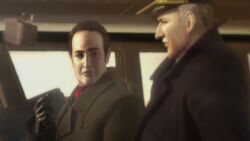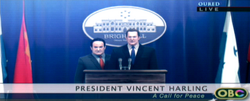Seryozha Viktrovich Nikanor[2] was the serving Prime Minister of the Union of Yuktobanian Republics around the turn of the 21st century. He was a strong proponent of peace and a central figure in both the escalation and resolution of the 2010 Circum-Pacific War.
Biography
Pre-war administration
Nikanor took office sometime after the end of Prime Minister Samanov's time in office (after 1991[3]); it is unknown whether or not Nikanor's term immediately followed Samanov's.
Prior to 2010, it is presumed that his administration worked to strengthen Yuktobania's diplomatic relations with the Osean Federation and supported the nuclear disarmament initiatives proposed by Osea's president, Vincent Harling.[4] It is also possible that Nikanor's administration took part in the cooperative construction of Osea's Basset Space Center.[5]
Circum-Pacific War (2010)
Sometime in mid-2010, an unspecified series of events led Nikanor and the Yuktobanian leadership to begin spying on the Oseans. After a Yuktobanian squadron engaged a large formation of Osean aircraft near Cape Landers on September 23,[6] Nikanor authorized the deployment of a reconnaissance aircraft to the Osean mainland. The spy plane was ultimately lost, and a number of responding Yuktobanian fighters were also shot down by Wardog Squadron.[7]
Removal from office and imprisonment
Sometime before September 27, a group of right-wing nationalists (likely displeased with Nikanor's perceived failure and weakness) staged a coup and removed Nikanor from office[8]; the deposed prime minister was subsequently imprisoned at an internment camp in northeastern Yuktobania.[9] Without Nikanor to stay the military's response, the new regime proceeded to declare war on the Osean Federation and launch several blitz attacks against its former ally.[8]
Rescue
In the early morning hours on December 23, members of the Yuktobanian resistance (led by OADF Captain Jack Bartlett) staged a rescue effort for Nikanor. Despite being heavily sedated by his captors, Nikanor was liberated from the internment camp driven to nearby Krylo Airfield. Nikanor slowly regained consciousness and was spirited onto a commandeered C-1 Trader piloted by Bartlett. Due to the efforts of Razgriz Squadron, Bartlett, and the resistance, Nikanor escaped[10] and was safely transported to the OFS Kestrel.[8]

Nikanor and Captain Nicholas A. Andersen aboard the Kestrel's bridge
- "Attention, Yuktobanian fleet. This is Prime Minister Nikanor, representative of your government. I am on the...Kestrel?"
- ― Nikanor[11]
Nearly one week later, on December 29, the Kestrel and its fleet were intercepted by a large Yuktobanian naval armada. Despite Nikanor's attempts to reason with his countrymen, the fleet commander called the prime minister a traitor for joining with the enemy and ordered his fleet to sink Nikanor along with the Oseans. When the Yuktobanians began firing upon vessels that would not comply with these orders, the Kestrel's commanding officer, Nicholas A. Andersen urged Nikanor to take his leave and seek out President Harling,[11] who had returned to the Osean capital, Oured, several days before Nikanor's rescue.[9]
Ending the war

Nikanor's and Harling's televised address to their respective nations from Bright Hill
As soon as it was possible, Nikanor departed from the Kestrel and was transported to Oured, where he met with Harling; the two leaders agreed to an immediate ceasefire. At 2200hrs on December 30, Nikanor and Harling held a joint press conference at Bright Hill. During the address, Nikanor symbolically stood shoulder-to-shoulder with Harling as a sign of solidarity between the two nations. Nikanor advised that the war's true instigators still remained at large, and Harling urged both Osean and Yuktobanian forces to aid the "brave pilots" who were "flying east to meet the enemy." Nikanor ended the address by challenging those who deal in violence to come "before the light of peace and harmony."[1]
Post-war administration
Details regarding Nikanor's service as prime minister after the conclusion of the Circum-Pacific War remain unknown. It is possible that his administration worked to restore relations with Osea and oversaw Yuktobania's post-war reconstruction efforts until the end of his term.
Trivia
- "Seryozha" is the diminutive and familiar form of Sergei, a common male name in Russia.
- "Viktrovich" is a misspelling of "Viktorovich", which means "son of Viktor".
- "Nikanor" is incorrectly used as a surname; in the correct form, it would be "Nikanorov".
References
- ↑ 1.0 1.1 1.2 Cutscene 26, Ace Combat 5: The Unsung War.
- ↑ Ending credits, Ace Combat 5: The Unsung War.
- ↑ FOLLOW, ACES WEB. Published September 4, 1991.
- ↑ "Arkbird Declaration", GAZE: Arkbird Declaration Summit 2008. Published August 21, 2008.
- ↑ Cutscene prior to White Bird (Part I), Ace Combat 5: The Unsung War.
- ↑ Cutscene 02, Ace Combat 5: The Unsung War.
- ↑ Shorebirds, Ace Combat 5: The Unsung War.
- ↑ 8.0 8.1 8.2 Cutscene 23, Ace Combat 5: The Unsung War.
- ↑ 9.0 9.1 Cutscene 22, Ace Combat 5: The Unsung War.
- ↑ Heartbreak One, Ace Combat 5: The Unsung War.
- ↑ 11.0 11.1 Cutscene 24, Ace Combat 5: The Unsung War.
